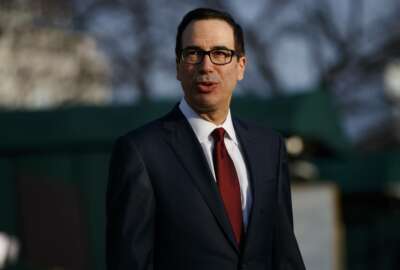
The next coronavirus stimulus bill
Even though no one has figured out the week-old, multi-trillion dollar stimulus bill, House leadership is already talking about a follow-on bill.
Best listening experience is on Chrome, Firefox or Safari. Subscribe to Federal Drive’s daily audio interviews on Apple Podcasts or PodcastOne.
Even though no one has figured out the week-old, multi-trillion dollar stimulus bill, House leadership is already talking about a follow-on bill. And maybe one after that. This as members of Congress aren’t even able to meet. For what’s next on the hill, Federal Drive with Tom Temin spoke to WTOP Capitol Hill correspondent Mitchell Miller.
Interview transcript:
Tom Temin: Let’s start with the complaints that have been coming from local governments about federal response. This has reached the ears of Congress, I guess also, hasn’t it?
Mitchell Miller: It has, and it’s been going on for quite a while but we really now have some concrete evidence that backs up the complaints. These were complaints related to the region basically that includes Virginia, Maryland and D.C., but also includes Delaware, West Virginia, Pennsylvania. And what the House Oversight Reform Committee did was look at what was happening with the state’s request to get medical equipment related to the coronavirus, and the findings were pretty troubling, especially for people around the Washington area. Just a few examples to site. Obviously FEMA cannot respond to every single request it gets, and some of these are wish lists to keep that in mind, But nonetheless, D.C., for example, had requested over a a million N-95 respirators those very effective masks to protect health care workers. They only received a little over 5000. They requested 10,000 test kits, did not receive any from FEMA. Virginia and Maryland also made their request. Virginia had a little better luck in connection with the N-95 masks. It requested more than two million. It received about a quarter million. They also requested 500,000 swabs for those tests. They did not get any of them. And Maryland also had some interesting figures. One of them that was a grim request, was a request for 15,000 body bags. In the event of things happening, they have not received any. So the members of Congress obviously very upset about this, they said. They have been sending off the warning bells for weeks, saying that they were going to need this equipment and they thus far have only see scene really small fractions of that. They say they are going to continue to press the federal government and FEMA to get more from these agencies,
Tom Temin: And let’s move on to the idea of a fourth legislative package. I guess the $2 trillion one was number three. Could this be part of that? That is, the lack of response or the perceived lack of response. What else could be in there?
Mitchell Miller: Right. House Speaker Nancy Pelosi is really pushing hard to get this fourth piece of legislation going. A lot of Democrats are behind her. Republicans have some different ideas. We’ll get to that in a moment. But one of the things that she says will likely be the biggest impetus to get this fourth piece of legislation through will be the request for more state and local assistance. She thinks that’s going to be the driving force to actually get more people on board with this. Right now they’re trying to frame it as you know, related to infrastructure, which has become kind of a joke unfortunately on Capitol Hill, because it’s been mentioned so many times where Democrats say we have common ground with President Trump. President Trump always says that he is in favor, this past week he again said he would be in favor of getting together with lawmakers on infrastructure to help create more jobs, to pump more money into the economy. But every time this seems to come up, it’s sort of fades away. So Pelosi is going to push this along with Democrats to see if they can use this as a framework. They introduced a lot of this legislation earlier in the year to see if they can kind of glom onto all these other issues that are, of course, popping up related to the coronavirus. On the other side, the Republicans are saying, well wait a second. We just approved more than $2 trillion dollars to get into the economy. We want to see as Republicans whether or not this money really moves to where it’s supposed to go. Is it actually going to generate things in the economy that we need to see. So GOP taking a little bit more of a stand back approach. Senate Majority Leader Mitch McConnell, saying he wants to just see if whether this money actually goes to where it’s supposed to and how it will actually impact the economy.
Tom Temin: And so, in that sense, than the Republicans and the Democrats have something in common. They both want a lot of oversight of whatever comes next.
Mitchell Miller: Right. They all want to make sure that this money goes to where it’s supposed to. One of the biggest complaints really from both sides is that a lot of times, even with the best intentions, lawmakers approved these huge chunks of money. And this is one of the well, this is the largest aid package ever approved by Congress. They want to make sure it goes where it’s supposed to. So there is, however, some political divide here on this issue related to oversight. House Speaker Pelosi has proposed this new select oversight committee that would be chaired by James Clyburn of South Carolina. It would look at not only where all the money is going, but also the response of the Trump administration. Some Republicans are a little bit wary of this. They wonder if this is going to become somehow, surprise in Washington, political, that it might start trying to point fingers at what the Trump administration is doing.
Tom Temin: (jokingly) Nah. That could never happen.
Mitchell Miller: Never happen, right Tom? Right, But at any rate, they do want to make sure that the money goes as I said to the right places. They just want to make sure that this does not get political. And as you’re aware, the Republicans have also been complaining that they think that Democrats in this next fourth package are going to just make it a Christmas tree wish list and try to attach all these pieces of legislation that they’ve been trying to pass for a long time and, in their words, basically take advantage of a crisis. Republicans say they’re going to be very wary of some of these things that the Democrats are trying to do. Democrats say that a lot of these things, in their view, they’re legitimate. They’re just trying to get help to people who need it
Tom Temin: And getting back to the fourth possible package. I believe everyone thinks that there are going to be technical corrections and makeups that have to be put in to fix the third bill, the big bill. Do we know what some of the corrections might be yet?
Mitchell Miller: Well, some of them will be ones that affect us right here in the Washington area. We’ve talked about the fact that D.C. was categorized as a territory and lumped in with the territories, and as a result, it did not get the funding that the district felt it should get. It was not categorized as a state, so they’re going to try to fix that. Because the states all received one and a quarter billion dollars. D.C. on the other hand, because it was categorized as a territory is only in line for about $500 million. So it’s losing out on nearly three-quarters of a billion dollars. Democrats say they definitely want to get this fixed. House Speaker Pelosi, actually unprovoked, has mentioned this several times, so that’s certainly one of them. There’s a lot of other technical issues that still need to be addressed. There’s some issues related to unemployment insurance and how that is dolled out. There’s a lot of tweaks that are going to be happening. Of course, when this $2 trillion package went through, it went through, as Senator McConnell said, the majority leader, in warp speed, for in terms of Congress’s speed. So a lot of things got moved through very quickly and they’re certainly some things they have to tweak.
Tom Temin: And while we have you, what’s it like on a deserted Capitol Hill, and members. I guess they’re all telecommuting or tele-conferencing. But they’re not seeing each other right here in the capitol.
Mitchell Miller: It’s very eerie, frankly, because, well, Congress often leaves, as you know, for breaks. Usually there’s a lot of visitors here, there’s school groups, there’s staff. There’s a ton of people here in the capitol, even when they’re not in session. Right now, it is just absolutely pin dropping quiet and all the corridors. Of course, there’s Capitol police and maintenance people in the architect of the Capitol staff here. But other than that, House Speaker Nancy Pelosi has actually been coming in and doing her work here at the Capitol, but otherwise it’s virtually deserted. So I’ve talked to lawmakers about how they deal with this situation because they obviously deal with personal interaction so much, whether it’s their constituents or other lawmakers. And they say they are basically on the phone all day long. They are in conference calls, they’re in Zoom calls. They are literally picking up the phone and calling people. I talked to Senator Chris Van Hollen of Maryland this past week, and he said they were on a huge call with health care workers and people in the health care industry getting all this feedback that we talked about at the outset here about the complaints about the fact that there’s not enough medical equipment. What are you doing for us? How are you helping us? Obviously, they’re getting a lot of feedback to from small businesses. Lots of anxiety related to the economy. Many of these businesses don’t know if they can survive another few months without making sure that they get some of that money that we were just talking about. That’s in the pipeline. So it’s a really strange time, obviously for everybody across the country. But it’s a very different kind of dynamic here in Washington, and it’s really prompted a new discussion of how can Congress actually operate outside of the U.S. Capitol outside of Washington. And even House Majority Leader Steny Hoyer, who has been very reticent on the issue of whether there would be some kind of remote voting, he kind of softened his views this past week and indicated maybe they do need to look at this because nobody really knows how long this is going to last, even though the House and Senate have said that they plan to hopefully be back by April 20th. There is a feeling that that may be wishful thinking, especially since we’re now moving into this intensifying period where these, unfortunately, these numbers of cases and deaths are going to continue to rise. So there’s a lot of concern in Congress about how are they going to continue to carry out things like oversight hearings, just basically approving all these normal bills that they normally would be looking at right now.
Tom Temin: Mitchell Miller is Capitol Hill correspondent for WTOP. Lots of questions Not too many answers yet, but maybe a few ghosts from 1800 wafting through there.
Mitchell Miller: Maybe I need to look around the corridors, makes sure I’m not catching up with history somewhere.
Tom Temin: All right, thanks for joining us.
Mitchell Miller: You bet.
Copyright © 2025 Federal News Network. All rights reserved. This website is not intended for users located within the European Economic Area.




